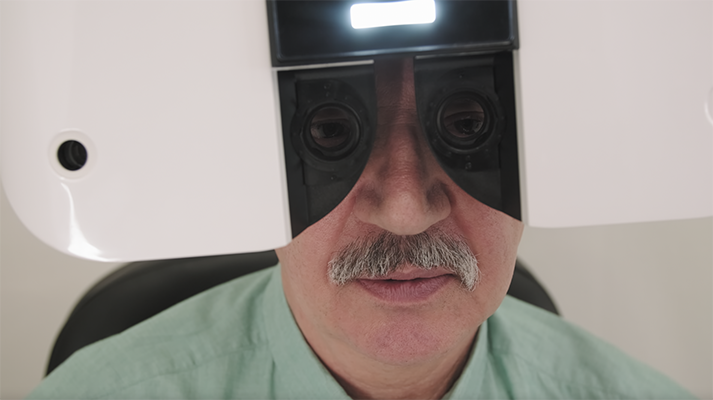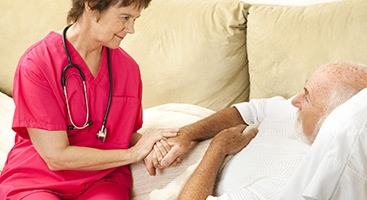PREMIER HOME CARE SERVICE IN NAPLES, FL
QUALITY CARE IS OUR COMMITMENT
Glaucoma Awareness

What Seniors and Caregivers Need to Know about Glaucoma
Even though it is the second leading cause of blindness, few people know about glaucoma. Seniors are especially at risk and need to know the facts.
More than 3 million people in the US have glaucoma. Many are seniors. Many don’t know they have the condition. However, this symptomless disease can be stopped before it does more damage.
The month of January is a time for spreading information about health problems. Glaucoma is one such disease. Many people are aware that glaucoma affects eyesight, but few have the facts straight. Since glaucoma can be very serious and affects many seniors, it is important to learn about this “sneaky thief of sight.”
What You Need to Know about Glaucoma
What is Glaucoma?
The term “glaucoma” actually describes different kinds of eye diseases that damage the optic nerve. Some examples of types of glaucoma include:
• Primary Open-Angle Glaucoma • Angle-Closure Glaucoma
• Secondary Glaucoma
• Normal Tension Glaucoma
Each kind of glaucoma has its own unique features. All are related to pressure in the eye. Most progress gradually and subtly. As a result, many people experience no symptoms.
How Serious is Glaucoma?
Glaucoma is considered a sneaky disease because it presents with so few symptoms. However, the disease is serious. If left untreated, glaucoma causes vision loss and eventually blindness.
Acute types of glaucoma are the exception and are also serious. They are accompanied by sudden, severe symptoms like redness, nausea, and severe pain with blurriness or visual disturbances. Emergency treatment is necessary to prevent blindness.
Who is at Risk for Glaucoma?
Individuals who meet the following criteria have an elevated risk of this disease:
- Age 60 or older
- African-American or Hispanic-American
- History of eye problems
- Family history of glaucoma
- High blood pressure
- Heart disease
- Regular use of corticosteroids

How is Glaucoma Diagnosed?
Since glaucoma often presents with no symptoms unless the disease is acute, doctors make their diagnosis based on several tests. Medical tests for glaucoma include:
• Tonometry (internal pressure)
• Pachymetry (corneal thickness)
• Perimetry (vision range and scope) • Comparisons over time (photos of the optic nerve)
What are Treatment Options for Glaucoma?
Prescription eye drops are the main treatment for glaucoma. Theymust be administered correctly and regularly, according to a doctor’s directions. In severe cases, glaucoma can be treated with prescription medications or surgery.
Did You Know?
Currently, glaucoma is not classified as a fully preventable or curable disease. However, glaucoma can be treated to prevent the disease from doing more damage.
Helping Seniors with Eye Health
Since glaucoma is a serious disease, it is important for seniors and their caregivers to take steps to monitor for and treat the condition. Seniors often need help in this process.
1. Encourage Regular Eye Checks
Seniors often experience some degree of vision loss as they age. Many are not alarmed or do not notice. As a result, many seniors do not see their eye doctor regularly.
In order to monitor for glaucoma and other eye problems, seniors should have an annual eye exam. Encourage seniors to attend their exams faithfully. It can be helpful to offer a ride since many seniors struggle with driving for a few hours after eye exams that require dilation.
2. Complete Treatment Properly
The main treatment for glaucoma is an eye drop prescription. Due to tremors, vision issues, and other health problems, seniors may have difficulty administering their drops themselves. Memory challenges can also cause seniors to forget this important part of their routine. Caregivers can help by offering reminders and even administering eye drops according to doctors’ directions.

Whether you are looking for a reliable nurse for different medical services, or a professional aide for personal care services, Gulfshore Home Care is here to help. Because every client’s needs and lifestyle are different, our in-home care team will provide services specifically based on your loved one’s condition and circumstances.

We are located in the areas of Naples, Bonita Springs, Estero, and Marco Island. Please do not hesitate to give us a call at 239-249-8318

With our home health care services you will be able to live a happy, safe, and independent life. We invite you read more about us. Every situation is unique, so to have all of your specific questions answered with personalized information from a friendly local home care expert, call 239-249-8318 now!
PERSONAL CARE
Our Certified Nursing Assistants and Home Health Aides are the best in the area. Call us today for a free consultation so we can develop a plan for your needs.
SKILLED NURSING
We have skilled nurses, whether you need 1 hour to 24 hour home health care; we will match you with a Highly Qualified caregiver to provide services for your needs.
COMPANIONS
If you are looking for a companion to provide company, we will ensure that you are satisfied by providing you with hand picked caregivers to meet your needs.



